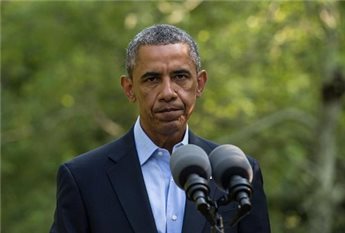WE DO NOT NEED US EMBASSY: BOLIVIAN PRESIDENT
 Cochabamba, Bolivia, 27 Sha’ban 1434/5 July 2013 (MINA) – Bolivian President Evo Morales, whose plane was diverted in Europe this week due to false rumors that US surveillance whistleblower Edward Snowden was on board, says the Latin American country does not need the United States Embassy in La Paz.
Cochabamba, Bolivia, 27 Sha’ban 1434/5 July 2013 (MINA) – Bolivian President Evo Morales, whose plane was diverted in Europe this week due to false rumors that US surveillance whistleblower Edward Snowden was on board, says the Latin American country does not need the United States Embassy in La Paz.
On Tuesday, France, Spain, Portugal and Italy refused to allow Morales’ plane, which was flying from Moscow back to Bolivia, to cross their airspace.
Morales’ life had been put in danger by the forced emergency landing in Austria, Bolivian Foreign Minister David Choquehuanca said after the incident, the Press TV reported as monitored by Mi’raj News Agency (MINA).
Speaking on Thursday in the Bolivian city of Cochabamba where the leaders of Venezuela, Ecuador, Argentina and Uruguay gathered to show their solidarity with the Bolivian president, Morales blamed the US for pressuring European states to refuse to allow his plane to fly through their airspace.
He added that his plane was forced to land in the Austrian capital Vienna and called it a violation of international law.
“We do not need the embassy of the United States,” said Morales, adding that leaders of his party had asked him to take action.
“We don’t need them to come here with the excuse of cooperation,” he stated.
“My hand would not shake to close the US Embassy. We have dignity, sovereignty. Without the United States, we are better politically, democratically.”
The Bolivian president was in Moscow to attend a meeting of natural gas-producing nations.
Bolivia is one of the countries to which Snowden has applied for asylum.
Washington has asked Ecuador, Cuba, Venezuela, and Russia not to provide asylum to Snowden.
On June 6, The Guardian reported that a top secret US court order allows the US National Security Agency to collect data on the millions of US citizens who are customers of the phone company Verizon.
On the same day, the Washington Post reported that the NSA had direct access to internet servers, saying their source, a career intelligence officer, was horrified about the capabilities of the systems used by the US intelligence agency.
On June 9, Snowden admitted his role in the leaks in a 12-minute video posted by The Guardian.
The NSA scandal took even broader dimensions when Snowden revealed information about its espionage activities targeting friendly countries. (T/P09/P03).
Mi’raj News Agency (MINA)








